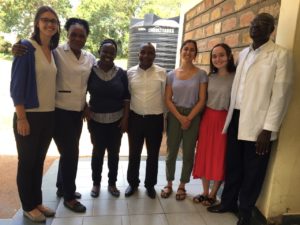 Choosing to come back to Kisumu, Kenya for my resident research project was an easy decision. I had worked in Kisumu over multiple years in medical school through the University of California, San Francisco – Family AIDS Care and Education Services, and had always known I wanted to return to continue to build on those relationships I had formed over the prior years. My research project, “Clinical Knowledge of Essential Maternal and Child Health Services in Kenya” involved interviewing health providers in Kisumu, Homa Bay, and Migori counties in western Kenya about their commodities, training, and knowledge around four maternal and child health topics – pre-eclampsia, postpartum hemorrhage, post-abortion care, and neonatal resuscitation.
Choosing to come back to Kisumu, Kenya for my resident research project was an easy decision. I had worked in Kisumu over multiple years in medical school through the University of California, San Francisco – Family AIDS Care and Education Services, and had always known I wanted to return to continue to build on those relationships I had formed over the prior years. My research project, “Clinical Knowledge of Essential Maternal and Child Health Services in Kenya” involved interviewing health providers in Kisumu, Homa Bay, and Migori counties in western Kenya about their commodities, training, and knowledge around four maternal and child health topics – pre-eclampsia, postpartum hemorrhage, post-abortion care, and neonatal resuscitation.
As I was awaiting my elective block, I looked forward to transitioning back into a research role after primarily focusing on my clinical work for the past two years during residency. Once I arrived, I realized that untangling my research and clinical roles was not as easy as just turning off one switch and turning another on. As every provider indicated what commodities they did or did not have at their facility, I imagined myself trying to respond to maternal health emergencies like postpartum hemorrhage without what I considered easily accessible supplies in the United States – uterotonic medications like misoprostol or methergine (ergometrine) or an intrauterine balloon tamponade that I did not have to fashion from a condom catheter, as many did in the clinics I visited. Similarly, as providers talked about ways to improve their knowledge through simply getting access to up to date guidelines or journal articles; I noted how lucky I was to have access to millions of review articles and guidelines on my phone at all hours or day and night. Despite these challenges, the providers I met were not unlike my colleagues in the United States – all had a strong determination to care for mothers and infants. Multiple of my interviews were stalled as providers prioritized patient care above all else, sometimes waiting an hour as a provider pushed with a patient to deliver a healthy infant before starting back on our questionnaire where they left off.
I do not think I truly understood what it meant to be a clinician scientist until this summer as I had the knowledge and background to not only conduct my research project, but also put those results in a broader clinical context. I’m very much looking forward to returning to North Carolina where I can put more of my clinical skills to use, but I know that the “research switch” will not turn completely off. I’m very grateful to that – my hope is that the focus on research will continue to push me to provide the most evidence-based care for my patients and that my findings from this summer will allow the providers I met in western Kenya to do the same for their patients.
